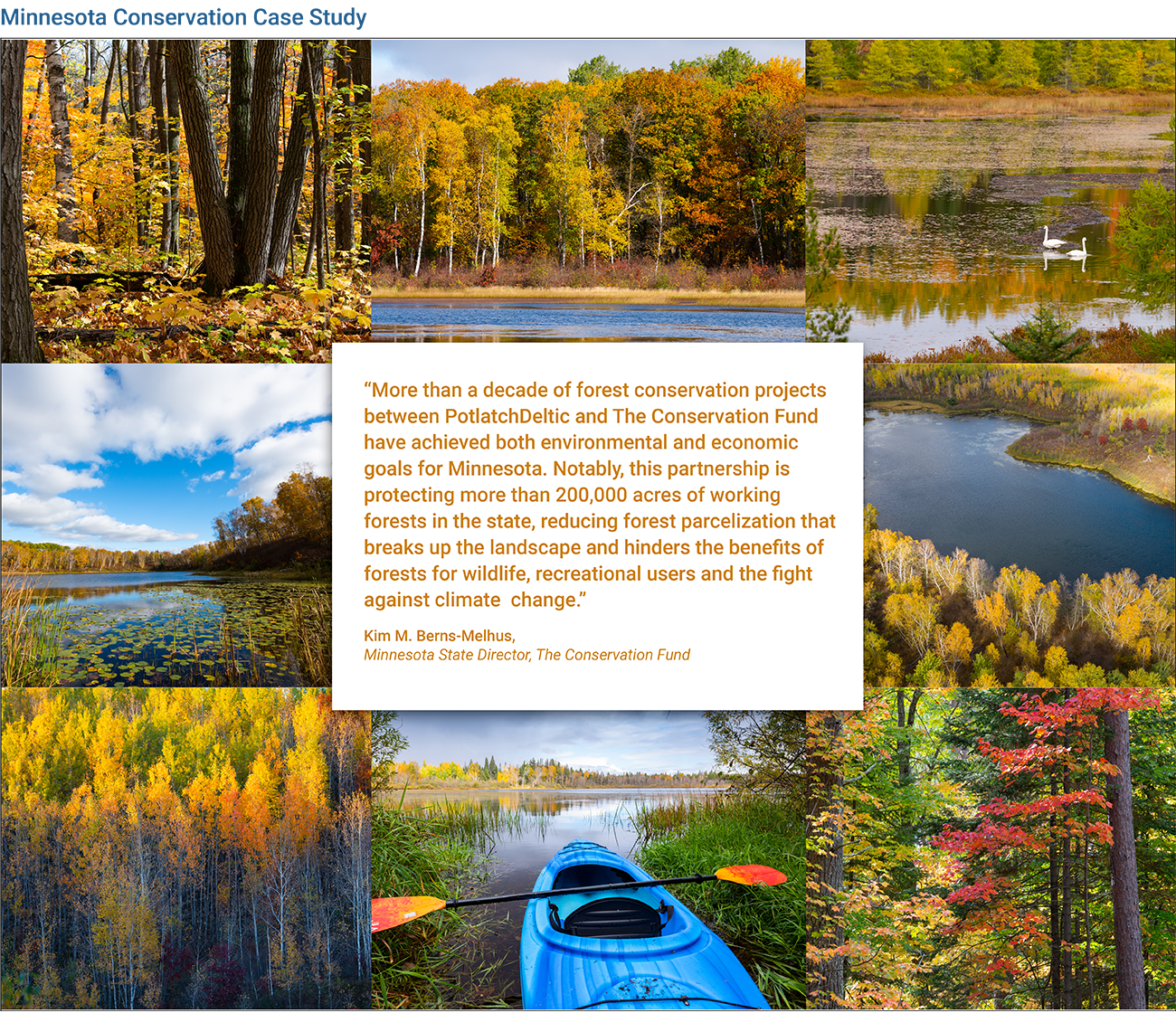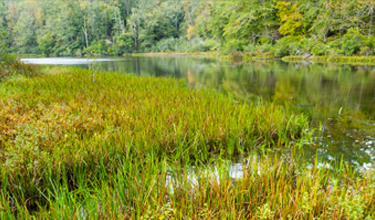
Case Studies:
Real Estate
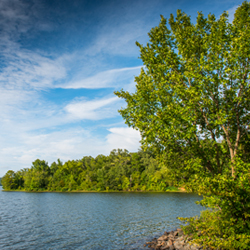
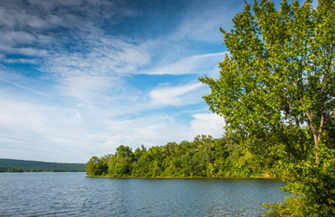
Central Arkansas Water Conservation
In June 2024, PotlatchDeltic and Central Arkansas Water (CAW) completed the purchase and sale of 2,047 acres of forestland in the Lake Maumelle watershed, a vital source of drinking water for the City of Little Rock and surrounding communities. This transaction marks the latest chapter in a strong, trust-based relationship dedicated to providing future protection for one of Little Rock’s most essential natural resources while balancing conservation priorities with economic and urban development considerations.
For CAW, the goals were clear: prevent future development that could possibly disrupt water quality. While PotlatchDeltic’s sustainable forestry practices align with conservation values, long-term ownership of the land by CAW was a crucial factor. Under CAW’s ownership, this land could be maintained as a buffer to protect streams and the Maumelle River headwaters before they even reached the lake. This buffer would help control potential contamination sources and maintain water quality from the point where streams exit the adjacent U.S. Forest Service land.
What made this transaction possible wasn’t just a shared vision for conservation, but years of trust and collaboration. PotlatchDeltic has long understood CAW’s watershed protection priorities, and both organizations worked together aligned by their respective sustainability goals. Identifying strategic opportunities, like this sale, fosters an environment where forestland can continue to benefit both people and nature. By keeping the dialogue open, the two organizations have developed a model where conservation and economic considerations work hand in hand.
This transaction is more than just a land sale, it’s an example of how public and private entities can work together to balance environmental protection with responsible land management. PotlatchDeltic’s commitment to sustainable forestry management gave CAW confidence that the land had been well-managed leading up to the sale, while the land sale ensured that growth pressures wouldn’t encroach on critical watershed areas. As development pressures near critical watershed areas increase, transactions like this set a precedent: when organizations align their goals, meaningful conservation outcomes become possible.
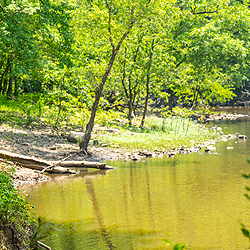
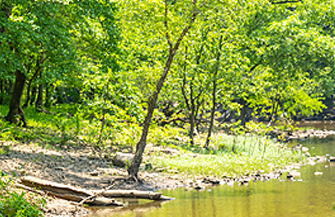
Collaborating With Indigenous Communities
In 2024, PotlatchDeltic sold approximately 3,900 acres of working forests to the Maskoke (Muscogee) people to preserve a critical viewshed for their Ekvn-Yefolecv ecovillage in Coosa County, Alabama, enabling the community to protect their cultural and environmental heritage.
The Maskoke, a small but resilient Indigenous community, are actively working to sustain their language, traditions, and ecological knowledge. Their ecovillage, located adjacent to the purchased land, is a self-sustaining community that integrates regenerative agriculture, traditional architecture, and conservation-driven land management. Recognizing the importance of unobstructed landscapes for their spiritual and cultural continuity, the Maskoke sought to secure the land to prevent future timber harvesting or real estate development that could disrupt their way of life.
Unlike traditional conservation sales, which often involve public funding or intermediary organizations, this acquisition was privately funded through donations from conservation advocates. The relationship between PotlatchDeltic and the Maskoke was initiated through these philanthropic connections, demonstrating the power of collaboration in achieving meaningful conservation outcomes.
Initially, the Maskoke sought to purchase 1,000 acres, but after an extensive property review, it became clear that a larger land area was necessary to fully protect their viewshed and cultural sites. With extensive experience in conservation land sales, PotlatchDeltic worked closely with the Maskoke’s representatives and forestry consultants to craft a solution that balanced the values of cultural preservation, economic viability, and long-term environmental stewardship.
The newly acquired land contains longleaf pine stands, a native species critical to the Maskoke’s traditional practices, as well as habitat for wildlife that the community will actively conserve. Additionally, the land provides sustainable timber resources, allowing the Maskoke to continue traditional practices such as tree blessings and the construction of culturally significant structures.
This project reflects PotlatchDeltic’s broader commitment to strategic conservation outcomes. By prioritizing both economic and environmental sustainability, the company’s working forests continue to serve multiple purposes, including supporting timber production, carbon sequestration, biodiversity, and cultural preservation. The sale to the Maskoke highlights how private landowners, conservation advocates, and Indigenous communities can work together so that forests are managed in a way that they can remain vibrant, resilient, and deeply connected to those who depend on them.
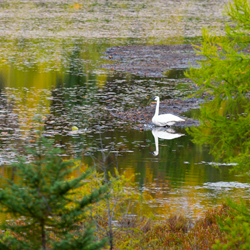
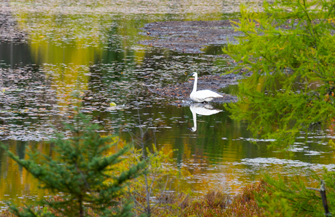
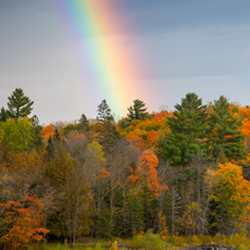
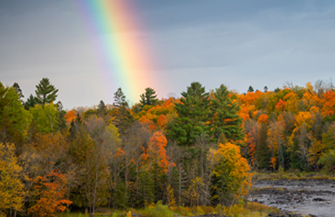
Minnesota Conservation
A significant portion of the timberland we once owned in north-central and north-eastern Minnesota was uniquely situated in its ability to participate in conservation outcomes. Over the last 17 years, we have implemented a strategy to work with numerous private and public partners to sell acreage in Minnesota for conservation and other public values. When our final planned conservation sales in Minnesota were completed, 157,000 acres in total were sold for these purposes. The conservation transactions have accomplished several goals among a wide range of stakeholders including opening landlocked parcels, keeping working forests as forests, protecting wildlife habitat, wetland mitigation restoration banks, tribal lands, recreational trails, and preserving unique locations.
Sometimes complex transactions can accomplish a set of very different goals among a range of stakeholders. Such was the case with the “Plan B” transaction, which involved the Boundary Waters Canoe Area Wilderness (BWCAW), a renowned recreational paradise in the northern third of Superior National Forest. Minnesota School Trust Lands held 82,400 acres of lands granted at statehood to support public education that were embedded within BWCAC, and that had not been accessible in order to generate revenue for the schools. The U.S. Forest Service (USFS) wanted to incorporate the lands into the BWCAW for recreational access.
The solution was a creative three-way land swap with The Conservation Fund (TCF) purchasing 40,000 acres of neighboring PotlatchDeltic land over five phases, which would then be exchanged in phases for equally valued School Trust Lands inside the wilderness area. TCF would then sell those lands within the wilderness to the USFS for incorporation into the BWCAW. The last two phases of this transaction for PotlatchDeltic consisted of just under 15,000 acres. The transactions ensured that the new Minnesota School Trust lands serve as long-term revenue sources for the schools, keep working forests as working forests, support jobs and local communities, and enable the lakefront lands placed within the BWCAW to be preserved for recreational access.
Protection of wildlife habitat was a conservation outcome of several of our transactions in Minnesota. A transaction with The Trust for Public Land (TPL), with a subsequent sale to Crow Wing County, resulted in wildlife habitat conservation on nearly 2,000 acres along the Mississippi River. The area is known as the Mississippi River Northwoods and was the largest remaining stretch of the Mississippi River unprotected from development in north central Minnesota. The land connected with other properties to provide a nine mile stretch of waterfront that protects eagle and red-shouldered hawk nests and provides critical habitat along the Mississippi River Flyway, used by 60% of North America’s migratory birds. In addition, the lands provided perpetual public recreation benefits for hunting, fishing, wildlife viewing, hiking and canoeing.
In another landmark multiparty conservation exchange, over 9,400 acres of PotlatchDeltic land was part of a series of exchanges with TCF that enabled Ecosystem Investment Partners (EIP) to acquire about 22,000 acres in the Sax-Zim Bog area and establish what was, at the time, the largest wetland mitigation bank in the country. The transaction resulted in further land swaps with St. Louis County and the Minnesota School Trust Lands. Ditches for farming had drained the original wetland and through ecological restoration, habitat was re-created for northern peat bog native plants and animals. The Environmental-Real Estate restored wetlands also benefited wildlife like moose, Connecticut warblers, great gray owls, boreal owl, and northern hawk owl. The wetland mitigation bank is adjacent to Minnesota’s Sax, Fermoy and Zim Wildlife Management complex which is protected and managed for sharp-tail grouse and sandhill crane.
Conservation transactions have also included tribal governments in an effort to consolidate tribal ownership within reservation boundaries. Established relationships with tribal leadership created an open exchange of ideas and strategies that produced desired land ownership exchanges. Direct sales to tribal governments from the Fond du Lac, Bois Forte, Leech Lake and White Earth bands enabled consolidation of tribal ownership within reservation boundaries to achieve objectives such as enhanced tribal hunting and gathering, wild rice lake management and other tribal social and conservation goals.
Conservation strategies can also include keeping forests from being converted to non-forest uses, which can be a significant risk in Minnesota. Conservation outcomes ensure that ecosystems stay intact, protect clean air and water, and maintain habitat for wildlife and provide recreational opportunities, while also providing sustained economic benefits including local jobs. In 2020, we completed the sale of 72,440 acres of forestland in 14 counties in northern and central Minnesota to TCF18 through its Working Forest Fund®. Called Minnesota’s Heritage Forest, the transaction is one of the largest land conservation projects in recent state history. The land sold includes approximately 31,600 acres located within the reservation boundaries of two bands of the Minnesota Ojibwe Tribe – the Bois Forte Band and Leech Lake Band. TCF will continue to manage these lands as sustainable working forests under SFI certification and continuing traditional recreational uses. TCF’s purchase will provide time for the development and implementation of permanent conservation strategies and sustainable management outcomes with the goal of transferring ownership to public and tribal entities over the next decade. These projects are just a few of many we have completed in our efforts to get the right lands in the right hands as we finish our land sales initiative in the state. Reflecting on our land ownership that spanned decades in Minnesota, we can see the tangible results of our relationships with many conservation partners that will leave a legacy in Minnesota.
